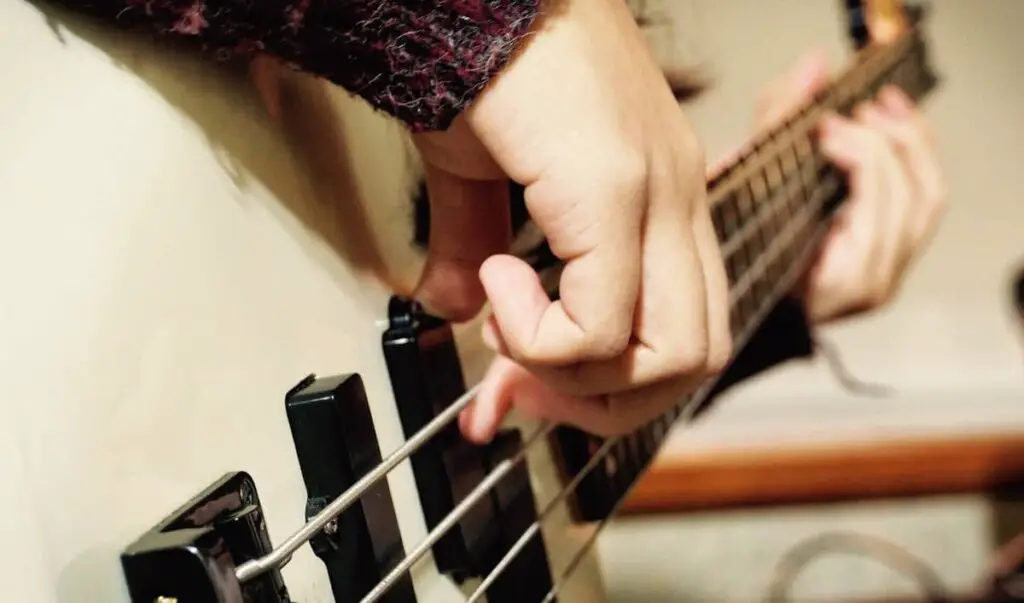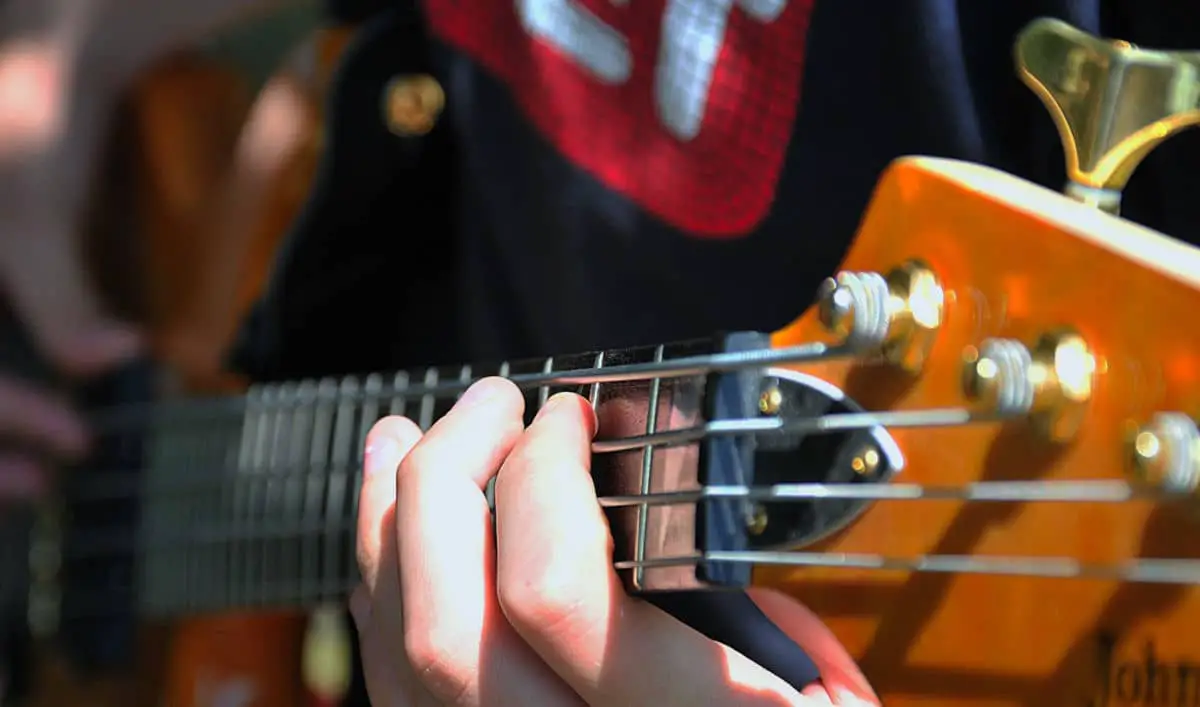I practiced a lot the first couple of months after getting my first 4-string. It took less than half a year till I thought I was decent, but looking back, I definitely wasn’t. Despite practicing a lot, I went about the learning process all wrong, and my playing suffered as a result. So, if you are looking to practice the bass more methodically than I did, how long should you practice bass each day?
You should practice bass for at least 30 minutes, at least every other day to see regular progress. If you are looking to become a professional bassist you should practice 2-3 hours, at least 5 days a week.
The amount you should practice bass largely depends on your musical goals. The important part is to go about it regularly and methodically.
I`m going to show you how much you should practice, depending on what you want to achieve as a bassist. This will ultimately make you a better bassist faster and make practicing a more enjoyable process.
How much should I practice the bass?
First and foremost, you need to turn practicing bass into a habit.
A great way of making a habit stick is to never skip it two days in a row. Thus, as a bare minimum, you should practice bass at least every other day.
Furthermore, the amount of time you should spend practicing depends largely on what your goal is:
If you are just looking to improve at playing bass over time:
- I recommend starting with 30-minute sessions every other day. For most people, this is enough for the sessions to be productive without becoming tedious. You can increase the time or frequency as long as you are able to make the habit of practicing stick. On average, it takes 66 days to form a new habit.
If you are looking to get good at bass as fast as possible
- I recommend practicing for about 1 hour at least 6 days a week. In order to process new skills and avoid burnout, it’s best to avoid extremely long practice sessions. The best way to channel your motivation into results is to practice for a moderately long period of time often.
If you are looking to become a professional bassist
- I recommend practicing 2-3 hours 6 days a week. If you want to make a living off playing bass you need to master every aspect of the instrument. Turning anything into a profession requires a lot of time and effort. Thus, Long and consistent practice sessions will be a necessity to reach your goal.
Having an occasional day off is important to avoid burnout. Thus, it’s never a good idea to play more than 6 days a week, even if your goal is to become professional.
It might seem intuitive to just practice as much as possible to get good, but frequent practice will always be superior to intensive practice.
For example, you are much better off practicing 30 minutes every day of a week, than 6 hours for one day. This makes it easier for your brain to register what you learn, develop muscle memory, and makes it less likely that you will become bored of practicing.

What should I practice on bass every day?
Your daily bass practices should include scales, finger exercises, rhythmic exercises, free play, and study of musical theory. As you start to notice weak spots in your technique or knowledge, you should start focusing more on improving in those areas.
You should always adapt your practice sessions to focus on your weaknesses. However, there are some essential bass exercises that you want to keep a consistent part of your sessions.. Here are the most essential ones:
Scales
Mastering new scales is a great way to optimize your bass practice. This is because scale help build muscle memory, teach you basic finger patterns, and develop your understanding of music theory.
Playing them also works as a great way to warm up and track progress. Therefore, I always start every practice session by playing scales.
Finger exercises
Similar to scales, playing various melodic patterns is an integral part of learning the bass guitar. They will improve your control of both your left and right hand, develop your dexterity and teach you how to move between strings in a smooth fashion.
A great example of this is the spider exercise, which teaches you how to use every string and use all of your fingers.
Rhythmic exercises
Even those who claim that they can`t hear the bass will notice when a bassist is out of time. Rhymtic exercises are thus essential for playing tight and developing a sense of musical time.
Put on a metronome and practice playing 4th, 8th, and 16th notes at different tempos. Practice every rhythmic pattern you are able to think of and focus on playing as tight and on time as possible.
Free play
Jamming on your bass will help you make use of what you’ve learned so far, develop a unique style and improve your composing abilities.
Put on a metronome or drum beat and play what you feel like playing. Oftentimes, you will feel inspired to incorporate techniques that you have just practiced and thus develop your playing naturally.
Music theory
Having a basic understanding of music theory is helpful for a bassist to be able to do their job well. Thus, while you don`t have to know how to read music to play the bass, it is helpful.
I recommend reading up or watching videos about how music theory applies to the bass and being conscious of it when you are playing. This will make it easier to play with other musicians and develop your ability to write bass lines for a band.
When to practice the bass
You should schedule time beforehand for when you are going to practice the bass. In general, playing when you feel like have time will stop you from turning it into a habit and leads to less focused practice.
Some people prefer practicing in the morning, while some are more motivated late in the evening. I prefer practicing after my daily obligations are taken care of and I’ve eaten dinner.
Only you can know when you get the most out of your practice. If you are unsure about what works for you, experiment with different times of the day. It varies from person to person, but most people have a sweet spot that works well for them.
Bonus tip: Keep a diary of your practice sessions. Write down what you did during your practice session as well as what went right and what went wrong. This makes it easier to see what is working and what should be changed in your practice sessions. Most importantly, it helps you keep track of your improvement.
Furthermore, when you just pick the bass up randomly, it’s usually equally easy to just put it down.
Thus, you should not make it a habit to practice when you just notice yourself having time. If you are serious about improving, you need to be disciplined and schedule when you are going to practice the bass ahead of time.

How long does it take to get good at Bass?
As a general rule, bassists with a regular and moderate practice schedule will be to play bass at an intermediate level after 6-12 months. With a methodical and disciplined approach to practicing a professional level of playing can be reached after 2-3 years.
To put it into perspective, I could play fast-fingerstyle basslines after less than 6 months. I had asked myself “How can I get better at bass fast?”, and my answer was to just play a lot and try to get as fast as possible.
In reality, my technique was horrible, and I had no knowledge of what I was doing. I was not using my left-hand thumb to support my hand, and strings that were supposed to be muted rang out without me noticing. I also had no idea about why the lines I played made sense harmonically, or how to apply my skills to actually writing bass lines.
All of this could have been learned at that point, had I been methodical about how I practiced. As a result, I had to learn a lot of basic skills when I thought I was well on my way to becoming a great bassist.
Thus, I cannot stress enough how playing bass is a lifelong gig.
It is possible to get good at the instrument in 6-12 months. However, this requires you to practice all aspects of playing the bass and doing it often.
Without an all-encompassing learning plan, you will end up with blind spots in your technique. These will then have to be fixed later, which will slow down your improvement.
Even when practicing correctly, mastery of the bass will take at least 2-3 years. Thus, to get good at the bass as fast as possible, treat it as a marathon and always focus on improving your weak spots.
Conclusion
How long you should practice bass each day is directly tied to what you want to achieve as a bassist.
Regardless of your goals though, you want to turn practice into a habit, schedule time for it beforehand, and stay consistent. Regular and moderate practice will help you develop your skills faster than lengthy irregular sessions.
You should have a plan for what to practice each time. Planning your sessions and tracking your progress helps in finding weak spots and staying motivated.
Lastly, having a good mindset is paramount for sticking with the bass long-term. You are going to fail a lot when learning any instrument. However, every mistake should be considered a step close to becoming great at the bass. This is important for staying motivated and not giving up on your instrument.

